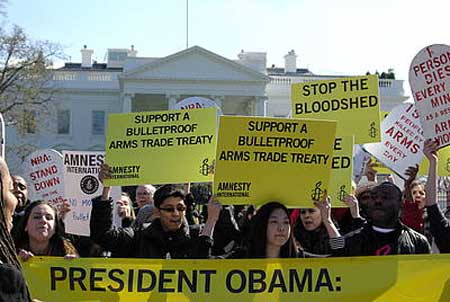

WASHINGTON, D.C. –-(Ammoland.com)- Today, the first anniversary of Secretary of State John Kerry’s signature of the U.N. Arms Trade Treaty (ATT), U.S. Senators Jim Inhofe (R-Okla.) and Jerry Moran (R-Kan.) again expressed frustration with the administration’s decision to sign U.N. ATT. Additionally, they are concerned with how the U.N. is handling the treaty’s implementation.
“It is deeply disturbing that the Government of Mexico, of all the nations in the U.N., has been selected to take the lead,” the senators said in a letter.
“Our concern is increased by the fact that the Mexican Government is working closely, and behind closed doors, with advocacy organizations that share its desire to expand the treaty’s scope…If the Arms Trade Treaty were amended as Mexico desires, our worst fears about the Treaty’s impact on our Second Amendment rights would be realized.”
To read Sen. Inhofe’s op-ed on this topic, click here.
Click here to view the letter to the president, or find the full text below:
September 25, 2014
President Barack Obama 1600 Pennsylvania Avenue, NW Washington, DC 20500Dear President Obama:
On the first anniversary of Secretary of State John Kerry’s signature of the Arms Trade Treaty, we write to express our concern and regret at the closed nature of the preparatory process for the First Conference of States Parties (CSP) to this treaty, and to register our conviction that the events of the past year offer further evidence that it is not in the national interest of the United States for the Senate to give its advice and consent to this treaty.
As you know, the treaty requires fifty national ratifications to come into force for those nations that have ratified it. To date, it has received forty-five. The initial Informal Consultations on the First CSP were held in Mexico on September 8-9, 2014.
Our offices have learned that the Government of Mexico asked Control Arms, an advocacy organization that has led the campaign for the treaty, to be the focal point for civil society participation in these consultations, and that Control Arms only allowed organizations that support and promote the treaty to participate in them.
As we and forty-eight colleagues notified you in our letter to you of October 15, 2013, the Arms Trade Treaty is unacceptable in part because it includes a national “responsibility” to “prevent . . . [the] diversion” of firearms, which could be used to justify the imposition of controls within the U.S. that would pose a threat to rights protected by the Second Amendment.
This letter, with our budget amendment 139 which was supported by fifty-one of his colleagues on March 23, 2013, makes it clear that the Arms Trade Treaty does not command the 67 votes necessary to receive the advice and consent of the U.S. Senate, without which it cannot be ratified or implemented.
The Government of Mexico has long urged that the Arms Trade Treaty should include in its scope the transfer of firearms inside the United States if such transfers could affect other nations, including Mexico. If the Arms Trade Treaty were amended as Mexico desires, our worst fears about the Treaty’s impact on our Second Amendment rights would be realized.
It is deeply disturbing that the Government of Mexico, of all the nations in the U.N., has been selected to take the lead in preparing for the CSP, which will ultimately be responsible for amending the Arms Trade Treaty. Our concern is increased by the fact that the Mexican Government is working closely, and behind closed doors, with advocacy organizations that share its desire to expand the treaty’s scope.
Your administration has emphasized the importance you attach to ensuring that the treaty remains within the United Nations and is not – unlike other treaties on conventional arms – taken outside the U.N. and controlled by advocacy organizations. The manner in which the Informal Consultations were conducted is a violation of one of the objectives your administration set out when it decided in 2009 to support the treaty negotiations.
We are particularly concerned that the precedent set by the first Informal Consultations will be repeated in future Informal Consultations, and that the First CSP itself will be open only to advocacy organizations that actively campaign for the treaty. This would exclude many U.S. and international civil society organizations – including the World Forum on Shooting Activities, the Sporting Arms and Ammunition Manufacturers’ Institute, the Defense Small Arms Advisory Council, and The Heritage Foundation – that have so far participated in the ATT process.
As you know, civil society organizations, once properly accredited, participate in U.N. activities on the basis that they do not speak for national governments. Rather, they reflect a range of views on the subject under discussion, and serve as a channel both for the expression of those views in the U.N., and for conveying their views on activities at the U.N. to the peoples of the United States and other nations. That is why we value their participation in the ATT process, even as we continue to oppose U.S. ratification of the treaty.
In the words of your own “Stand with Civil Society” agenda, which you launched in 2013 at the U.N., it is important for democracies to “defend and sustain the work of civil society amid a rising tide of restrictions on its work,” and to “roll back restrictions being imposed on civil society.” The example of the Informal Consultations shows that those restrictions do not come only from autocracies. They are being imposed at the U.N. itself, in the name of insulating the U.N., the Arms Trade Treaty, and its advocates from external scrutiny.
This fact is all the more disturbing because, in the past year, the aims of the treaty’s advocates have become obvious. In August, these advocates launched a campaign advocating the suspension of arms transfers from the U.S. and the U.K. to Israel as it sought to defend itself from Hamas’s missile attacks. The advocates failed to emphasize Iran’s role in arming Hamas, even though the U.N. itself has attested to Iran’s responsibility.
It has therefore become even clearer that, as we warned you in our letter of last October, one of the goals of the advocacy organizations is to hinder the United States from fulfilling its strategic, legal, and moral commitment to provide arms to key allies such as the State of Israel. It is these organizations that have been given the responsibility of serving as doorkeeper to the treaty process by the Government of Mexico.
We urge you to protest the manner in which the Informal Consultations for the First CSP for the Arms Trade Treaty were conducted, and to insist that all future meetings related to the treaty that are open to any civil society organizations be open to all such organizations. We reiterate our pledge to lead our colleagues in opposing the ratification of this treaty.
We appreciate your consideration on this issue and look forward to your response.
Sincerely,
Senator James Inhofe
Senator Jerry Moran
